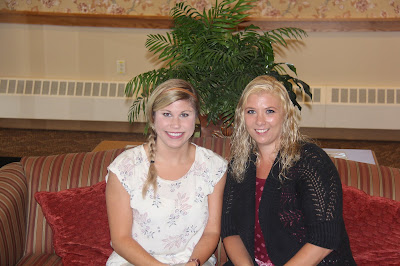 |
| Alycia Dezell and Stacie Jessmer, Certified Stroke Rehabilitation Specialists |
OGDENSBURG
– At any given time there can be as many as a dozen or more stroke patients
receiving therapy services through United Helpers.
While
traditional therapy is certainly better than no therapy at all, United Helpers
can now say they employ the region’s only two Certified Stroke Rehabilitation
Specialists.
Alycia
Dezell, an Occupational Therapist at RiverLedge Health Care & Rehabiliation
Center in Ogdensburg and Stacie Jessmer, a Physical Therapy Assistant at
Maplewood Health Care & Rehabilitation Center in Canton recently earned
their certification by completing a series of classes offered by the National
Stroke Association over the past several months.
“There
are only 40 Certified Stroke Rehabilitation Specialists in all of New York
State and until now the closest one was in Syracuse,” Mrs. Jessmer said. “Being
Certified Stroke Rehabilitation Specialists, we now know the most beneficial
ways and latest techniques for treating stroke patients.”
Ms.
Dezell said the course included a lot of lab-based work and data analysis.
“They used to say there was a small window of opportunity,
usually around a six month window, for someone to be able to reach their maximum
potential after a stroke. With new research we now know that fully recovering
from a stroke can sometimes take years. In some instances progress can even
continue throughout the remainder of their lifetime,” she said.
Mrs.
Jessmer said that it is her hopes that with their certifications, insurance
companies may be willing to provide additional therapy services for those
trying to recover from a stroke.
“Sometimes
insurance companies will only approve therapy for someone for up to three or
four weeks, but now with our certifications we have evidence-based information,
training and skills that we can use to show the insurance companies how
beneficial additional therapy could be,” she said.
Director
of Rehabilitative Services Terry L. Micelli said that stroke therapy at either
location could occur in an outpatient or inpatient setting. Ms. Dezell and Mrs.
Jessmer may provide services to those who just recently had a stroke or those
who have had a stroke in the past, but need additional therapy in order to reach
the highest level of function possible.
“There
is evidence out there that people who have had a stroke even three or four
years ago, can possibly regain some function with the help of a specialist,”
she said.
The
key, Mrs. Jessmer said, is constant stimulation in their environment through
specific functional-based tasks.
“To
be successful with neuro-therapy you have to stimulate the brain,” she said.
“Stroke patients need the same amount of sleep as anyone else, as when they’re
sleeping their brain can recover and process the information it has learned.
Throughout the day the best thing for them is constant stimulation within their
environment.”
Ms.
Jessmer said that information, which she and Ms. Dezell learned in the course,
is a much different approach than what is often taken with traditional therapy,
where stroke patients often work in little bursts and are then given “time to
recover,” before doing more therapy work.
In
addition to having each other to bounce ideas off of, Ms. Dezell said they know
have access to the National Stroke Association’s plethora of experts and
library of resources. She also said that in order to maintain their
certifications, they must recertify every two years and get an additional 16
hours of continuing education credits.
“This
will ensure that our patients are always receiving cutting edge treatment and
the benefits of the most up-to-date information and research available,” Ms.
Dezell said.
To
help provide their stroke patients with constant stimulation, Mrs. Jessmer also
said they will be relying heavily of the nursing staff at both facilities.
“It’s
a total team effort,” she said.
Mrs.
Jessmer and Ms. Dezell are also currently working on a presentation where they
will share some of what they’ve learned with other members of the therapy team,
nursing staff and people in key positions.
If
you feel like yourself or a loved one could benefit from therapy services
offered by a Certified Stroke Rehabilitation Specialist, please contact
Navigator Nicholas Maneely at (315) 714-3110 ext. 504.


